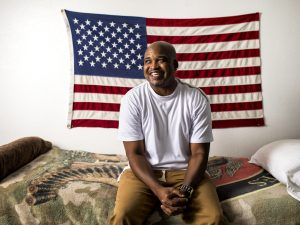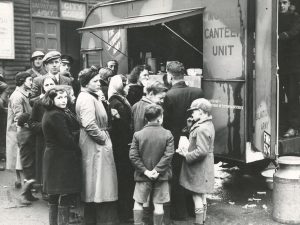Territorial Program Consultant for Social Services reports from the Gulf Coast on The Salvation Army’s continued ministry of recovery and renewal to those affected by hurricanes and flooding.
by Christopher Hogan –
October 7th will forever be etched in my memory; that was the day I assumed responsibility of social service coordination for all Community Recovery Centers in Mississippi and Louisiana. I’ll admit I was anxious and a tad fearful of what lay ahead.
Nothing could have prepared me for the destruction: cars piled on top of each other; boats lying in the middle of the road; homes moved a block down the street or sliced in half by trees. I’ll never forget seeing family members desperately searching through the rubble in hopes of finding some small memory of their past life…frustrated drivers attempting to start their flooded cars in vain…children playing with garbage for recreational purposes as their toys were all lost.
In the initial hours of my arrival, I felt great sadness, despair and concern for the future of these people. In the days that followed, my despair turned to inspiration and hope as I listened to stories of survival, determination and perseverance.
I’m proud to say that our Salvation Army was there from the very moment the storm hit, providing hope, comfort, courage and relief to the hundreds of thousands of survivors. When I think of heroes, I think of the courage and perseverance of the officers and staff at the Pascagoula, Mississippi corps. The officers lost their corps and quarters, and most staff lost their homes. One week after Katrina decimated their community, these dedicated workers toiled in 100 degree heat—without air conditioning—to provide emotional and pastoral care, food and debit cards to thousands of homeless survivors for roughly 14 straight days.
Some of the corps’ service team included displaced caseworkers from a local Salvation Army domestic violence shelter that had been destroyed during the storm. While speaking with the caseworkers, I asked if they were going to take a much-needed break after working two weeks non-stop. To my great surprise, they said, “No!” You see, right off the coast of Pascagoula in the Gulf of Mexico, was a large cruise ship with thousands of displaced residents. The caseworkers were very concerned because they had heard numerous reports of domestic violence on the ship. They respectfully told me that they would not rest until they knew that every woman in potential danger found appropriate shelter; they were determined to meet with cruise ship officials the next day. Here were workers who, having lost all of their own homes and possessions, were focused on the safety of others. Such selfless acts of caring and kindness were prevalent during my stay.
The Biloxi, Mississippi corps story is a demonstration of the power of God’s hand in the daily work of The Salvation Army. Just days before Katrina hit, the corps had purchased Yankie Stadium, a football field with extensive green space, full stands, bathrooms, locker rooms, office and storage space. The stadium was purchased so the land could be used to build the first Kroc Center in the Southern Territory; the Lord clearly had other plans.
Within days after Katrina hit the Biloxi coast with 30-foot waves, the corps responded by using the newly purchased Yankie Stadium to create a large community recovery center. The storage space was used for disaster relief supplies; office space was used for a pharmacy and medical clinic; showers, bathrooms and locker rooms were used to house and meet the needs of volunteers; the football field was used for tents for various agencies such as FEMA and the Southern Baptists (who provided meals); and the parking lot was used for drive-through feeding and a large heated tent that will house the corps and the social service efforts for the winter months.
The Salvation Army and the Gulf Coast communities still have a long road ahead in their recovery efforts—but Im here to tell you that there’s hope.











